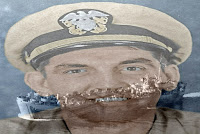Soleggiato: 90°F/32°C Roma, Lazio, Italia
Partly Sunny & Hot: 100°F/38°C
Cedar Park, TexasA friend who dies, it’s something of you who dies. Gustave Flaubert
Buonagiornata!
August 14th also fell on a Monday in 1944. Seventy-three years ago today at 4:54 p.m. a torpedo from the U 667 exploded at the stern of my dad’s sister ship, LST 921. The blast broke the ship’s
 |
| Charlie Botula and LST 920 |
My dad told that story to my brother Packy and I over Sunday dinner for years. But, the whatevers nagged at me for decades. Whatever happened to that Nazi U-boat after the attack? Whatever happened to Captain Harry Schultz? Whatever happened to the guys that Ensign Harold Willcox pulled out of the water? Whatever happened to the crew of that British ship? My father’s story and the remaining questions it raised, eventually prompted me to put my journalistic skills to work on a very personal family story, and in August of 2016, my book LST 920: Charlie Botula’s Long, Slow Target! was published by Amazon Books. So, my annual tribute to my father’s war-time
| Das Book! |
 |
| Commissioning- June 17, 1944 |
One evening in 2003, as I surfed the internet I came across a website devoted to World War 2
 |
| Don Reed in 1944 |
Their response was heartwarming. Seaman Larry Biggio had started a website dedicated to the
 |
| U 667 - The Villain |
 |
| Skip and Charles Botula 1945 |
Onward and upward!
Ciao,
MikeBo
© Mike Botula 2017
[Mike Botula is the author of LST 920: Charlie Botula’s Long,
Slow Target! writer of MikeBo’s Blog
and producer of the website www.mikebotula.com. Mike’s book is available from Amazon.com or on-demand
at Barnes & Noble.
No comments:
Post a Comment